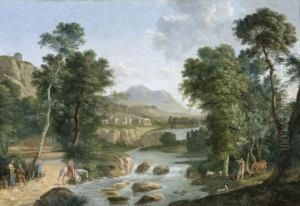Bartolome Sureda Paintings
Bartolomé Sureda y Miserol was a prominent figure in the Spanish artistic and industrial scene during the late 18th and early 19th centuries. Born in 1769 in Palma de Mallorca, Spain, Sureda is best remembered for his diverse talents as an artist, industrialist, and director of the Royal Porcelain Factory of Buen Retiro in Madrid. His contributions to the Spanish arts and manufacturing sectors were significant during a period of cultural and economic transition.
Sureda's early years were marked by a strong inclination towards the arts and sciences, leading him to pursue studies in these fields. His keen interest and natural aptitude in painting and drawing were evident from a young age. However, it was his involvement with the Royal Porcelain Factory that solidified his reputation as a key figure in the development of Spanish industrial arts. Under his leadership, the factory experienced a period of innovation and increased production quality, contributing to the elevation of Spanish porcelain on the international stage.
Throughout his career, Sureda was also deeply involved in the artistic community, engaging with contemporary artists and intellectuals. His contributions were not limited to the realm of industrial arts; he was also known for his work in painting and engraving. Sureda's artistic output, although less documented than his industrial achievements, displayed a keen eye for detail and a deep appreciation for the beauty of everyday life.
Bartolomé Sureda y Miserol's legacy is that of a visionary who bridged the gap between art and industry, contributing to the advancement of both fields in Spain. His efforts in modernizing the Royal Porcelain Factory had lasting impacts on the Spanish porcelain industry, and his artistic works remain a testament to his multifaceted talent. Sureda passed away in 1851, leaving behind a legacy that continues to be celebrated by art historians and enthusiasts alike.
